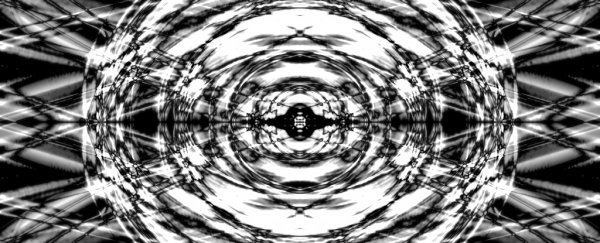The macro world as we know it is governed by Newton's laws of motion and gravity - what goes up, must come down.
But a team of physicists from Columbia University have put forward a theoretical paper that turns this idea on its head. They say there might actually be particles with negative mass - which under gravity, move up, instead of down - and they're all around us.
According to their paper, it's not any weird subatomic particle that has these properties, but the particles of sound we hear and produce every day - phonons - that are rebelling against the force of gravity.
So far, so strange, right? After all, sound isn't even a physical object, so how can the force of gravity have any impact on it?
This paradox is at the heart of the new hypothesis - what if, the researchers say, sound waves actually did carry mass. Negative mass. And that negative mass created its own tiny negative gravitational fields that push them up instead of down.
It sounds pretty wild, but there are three things to keep in mind here.
First, and most importantly, this paper is purely theoretical - that means the researchers have simply put forward a hypothesis and performed some detailed calculations based on how we know the world words, and shown that, in theory, this could be true.
That's not to say they've found any physical evidence sound waves carry negative mass as yet, they've simply shown that if it was the case, it wouldn't break anything else in physics.
The second qualifier is that the paper has only been published on the pre-print site arXiv ahead of peer review. So we need to see some independent verification of these numbers before we get too carried away.
Now keeping those first two in mind, the third thing you need to know is that this idea isn't actually that insane.
No, really. Bear with us, because there is some logical precedent that's gone into the hypothesis.
For starters, we know that negative mass particles exist - and they do move against a force in the opposite direction than you'd expect.
Just last year researchers created negative mass fluid in the lab for the first time, and when pushed, it accelerated backwards instead of forwards.
Okay, so negative mass particles might be real. But sound waves aren't actually particles, are they?
Sound waves move through matter and causes vibrations in the molecules around it, which results in those vibrations being passed on and hitting our eardrums so we can hear.
But although they're not particles in the traditional sense, sounds waves can be described mathematically as particles, called phonons.
Still, it's previously been thought that these phonons couldn't be affected by gravity - or have an effect on gravity - because they don't carry mass.
But earlier research by the team's leader, Alberto Nicolis, which was published in Physical Review Letters in May, provided some experimental evidence that this might not be the case - at least not under extreme conditions.
The experiment was conducted in zero-temperature superfluids, which are a strange type of fluid that flow with no resistance at all at temperatures close to absolute zero.
Under those conditions, Nicolis and his team reported seeing phonons' trajectories bend upwards, seemingly in opposition to the effect of gravity.
"In a gravitational field phonons slowly accelerate in the opposite direction that you would expect, say, a brick to fall," one of the team, Rafael Krichevsky, told Live Science.
The effect is too small to measure with existing technology, and there are also other potential explanations for this trajectory that have nothing to do with gravity.
But Nicolis' latest paper builds on the idea that the phonons were generating some type of negative gravitational field.
They propose that "the (tiny) effective gravitational mass of the phonon generates a (tiny) gravitational field. And the source of this gravitational field travels with the phonon," the team writes on arXiv.
"Thus, in a very physical sense, the phonon carries (negative) mass."
Now, we're not going to go into all the calculations carried out because they're pretty intense (you can read all about them in the paper).
But in short, the team was able to show mathematically that classical sound waves could carry mass - and not just in superfluids or the quantum world, but in real-world settings.
"We showed that, contrary to common belief, sound waves carry gravitational mass, in a standard Newtonian sense: they are affected by gravity, but they also source gravity," the team concludes.
They also outline ways we could experimentally test this idea going forward.
And that's important, not only because it could shift our fundamental understanding of the sound waves that exist in the world all around us all the time.
But also because this effect could impact the behaviour of other objects in the Universe - like neutron stars, which have incredibly dense cores where sound waves move at nearly the speed of light.
A lot more research is needed, but it's definitely an intriguing hypothesis to build on.
The paper has been published and can be read in full on arXiv.
